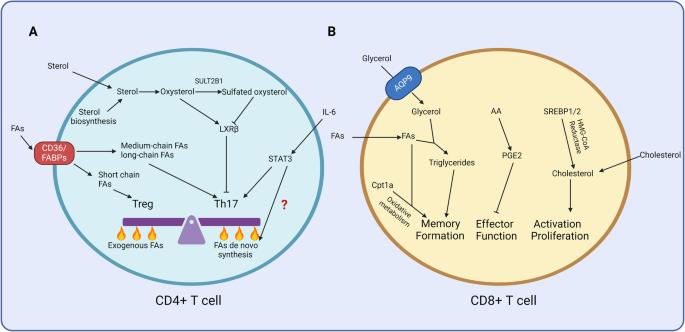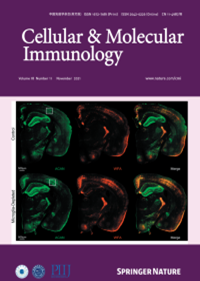Cellular metabolism regulates the differentiation and function of T-cell subsets
IF 21.8
1区 医学
Q1 IMMUNOLOGY
引用次数: 0
Abstract
T cells are an important component of adaptive immunity and protect the host from infectious diseases and cancers. However, uncontrolled T cell immunity may cause autoimmune disorders. In both situations, antigen-specific T cells undergo clonal expansion upon the engagement and activation of antigens. Cellular metabolism is reprogrammed to meet the increase in bioenergetic and biosynthetic demands associated with effector T cell expansion. Metabolites not only serve as building blocks or energy sources to fuel cell growth and expansion but also regulate a broad spectrum of cellular signals that instruct the differentiation of multiple T cell subsets. The realm of immunometabolism research is undergoing swift advancements. Encapsulating all the recent progress within this concise review in not possible. Instead, our objective is to provide a succinct introduction to this swiftly progressing research, concentrating on the metabolic intricacies of three pivotal nutrient classes—lipids, glucose, and amino acids—in T cells. We shed light on recent investigations elucidating the roles of these three groups of metabolites in mediating the metabolic and immune functions of T cells. Moreover, we delve into the prospect of “editing” metabolic pathways within T cells using pharmacological or genetic approaches, with the aim of synergizing this approach with existing immunotherapies and enhancing the efficacy of antitumor and antiinfection immune responses.

细胞代谢调节 T 细胞亚群的分化和功能
T 细胞是适应性免疫的重要组成部分,能保护宿主免受传染病和癌症的侵袭。然而,不受控制的 T 细胞免疫可能会导致自身免疫性疾病。在这两种情况下,抗原特异性 T 细胞在接触和激活抗原后都会发生克隆扩增。细胞代谢被重新编程,以满足与效应 T 细胞扩增相关的生物能和生物合成需求的增加。代谢物不仅是促进细胞生长和扩增的构件或能量来源,还能调节多种细胞信号,指导多个 T 细胞亚群的分化。免疫代谢研究领域正在迅速发展。我们不可能在这篇简明扼要的综述中囊括所有最新进展。相反,我们的目标是简明扼要地介绍这项进展迅速的研究,集中探讨 T 细胞中三种关键营养物质--脂质、葡萄糖和氨基酸--代谢的复杂性。我们阐明了最近的研究,这些研究阐明了这三类代谢物在介导 T 细胞代谢和免疫功能方面的作用。此外,我们还深入探讨了利用药理学或遗传学方法 "编辑 "T 细胞内代谢途径的前景,目的是使这种方法与现有的免疫疗法协同增效,提高抗肿瘤和抗感染免疫反应的疗效。
本文章由计算机程序翻译,如有差异,请以英文原文为准。
求助全文
约1分钟内获得全文
求助全文
来源期刊
CiteScore
31.20
自引率
1.20%
发文量
903
审稿时长
1 months
期刊介绍:
Cellular & Molecular Immunology, a monthly journal from the Chinese Society of Immunology and the University of Science and Technology of China, serves as a comprehensive platform covering both basic immunology research and clinical applications. The journal publishes a variety of article types, including Articles, Review Articles, Mini Reviews, and Short Communications, focusing on diverse aspects of cellular and molecular immunology.

 求助内容:
求助内容: 应助结果提醒方式:
应助结果提醒方式:


